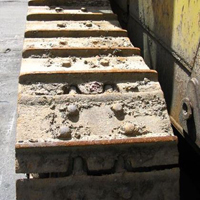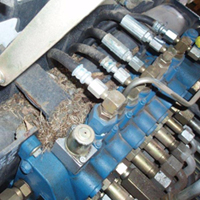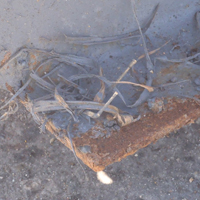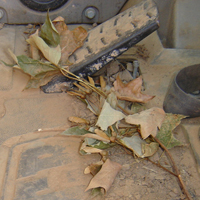Motor vehicles, motorcycles, tyres and machinery (including machinery parts) can introduce biosecurity risks into Australia. Such risks include, but are not limited to: live insects, seeds, soil, mud, clay, animal faeces, animal material and plant material such as straw, twigs, leaves, roots, bark.
It is an importer’s responsibility to ensure that motor vehicles, motorcycles, tyres or machinery (or their parts) are clean and free from biosecurity risks before they arrive in Australia.
Upon arrival in Australia, all motor vehicles, motorcycles, tyres or machinery (or their parts) are subject to biosecurity control, and may be inspected by a biosecurity officer at an approved arrangement site or wharf precinct, depending on the type of good.
Break-bulk goods must be inspected at a wharf precinct and containerised goods at an approved arrangement site. If contamination is found, options (at the importer or owner’s expense) may include:
- treatment of the goods (such as cleaning or fumigation)
- exporting the goods from Australia if they arrive in a heavily contaminated state
- destroying the goods.
Detailed import conditions for motor vehicles, motorcycles and machinery (or their parts) and tyres are available on the Biosecurity Import Conditions system (BICON). This may include requirements for import permits.
[Expand all]
Motor vehicles and motorcycles
New vehicles
New vehicles are subject to external inspection on arrival. If biosecurity risks are detected during this inspection, further treatment and re-inspection may be required.
For advice on contaminants that may be present and methods for removal or control, download the department’s New vehicle offshore pre-loading biosecurity risk guide.
Used vehicles
Used vehicles are subject to full external and internal inspection on arrival in Australia unless they have been processed by an offshore treatment provider recognised by the department. Used vehicles processed by recognised offshore treatment providers are subject to a reduced level of inspection on arrival in Australia, as contamination issues should have already been addressed in the country of export.
A list of currently recognised offshore treatment providers for used vehicles is available on the department website.
To arrange an inspection of your used vehicle, contact the local departmental office at the port of arrival. They will provide you with more detailed information about the inspection process and required documentation.
Decontamination of motor vehicles and motorcycles
Important exterior points to check:
- wheels, wheel guards, mud guards
- engine bay—remove water from any reservoirs (excluding radiator) and ensure your radiator is clean and free of debris in the cooling fins
- underside
- behind the fairings and side-covers
- above and around the fuel tank
- inside chassis rails
- external vents
- around window seals
- sticky protective wheel and bonnet covers on new vehicles.
Important internal points to check:
- boot area including spare tyre and wheel well
- internal compartments of motorcycles, such as under seat storage
- engine bay—remove water from the windshield reservoir and ensure the grille and radiator cooling fins are clean and free of debris
- internal storage compartments including console
- under seats and mats
- in seat folds
- internal vents
- internal window, door seals and around door locks.
Keys to motor vehicles and motorcycles should be provided to enable biosecurity officers to inspect internal compartments, engine bays and pannier racks (if fitted).
Recognised offshore cleaning and pre-inspection providers scheme
Companies that meet audit and cleanliness standards can apply to the department for recognition as an offshore treatment provider to clean and pre-inspect used vehicles offshore.
Further information on the scheme is available on the Recognised offshore cleaning and pre-inspection providers webpage.
Importing tyres
Importers must ensure that tyres are free from biosecurity risk material (BRM) before arriving in Australia.
This applies to all imported tyres, whether fitted to machinery or loose, including:
- New tyres
- Used tyres
- Retreaded tyres (where a new tread has been applied to a used tyre)
- Oversize tyres (tyres imported for use on large machinery such as mining machinery, dump trucks etc. These tyres cannot be transported in 6 hard sided containers and are shipped in open top containers or as break bulk).
Machinery
Machinery and machinery parts used in agriculture, mining, earthmoving, construction, animal farming, timber felling, horticulture, fruit handling and food processing are all subject to import conditions. All machinery must be imported clean and free from biosecurity risks. New and used machinery pose different levels of biosecurity risk and are treated differently.
New machinery must not have been used (including field testing) prior to import into Australian territory. If new machinery has been used, then the import conditions for used machinery will apply. Used machinery includes machinery or parts that have come into contact with soil, animal or plant materials when trialled, tested, or used in environments that can pose a biosecurity risk. Such machinery is subject to mandatory on-arrival inspection.




How do I avoid delays when importing used machinery?
Proper preparation can assist with on-arrival inspections of used machinery. Machinery may require dismantling for effective cleaning before importing into Australia.
To meet import conditions and prevent delays, ensure machinery cleanliness is maintained during transport. Machinery transported in a clean and dismantled state may be released following an inspection by the department. If a biosecurity officer can access all areas of a machine and confirm it is free from contamination, it may be released directly from biosecurity control. This is the most efficient way to import used machinery into Australia.
See also:
